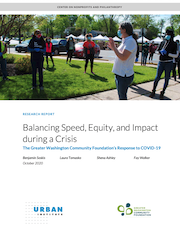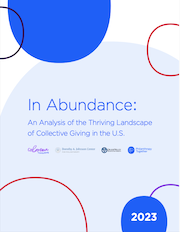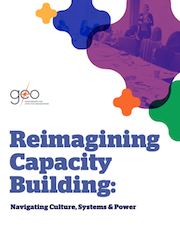Site Search
- resource provided by the Forum Network Knowledgebase.
Search Tip: Search with " " to find exact matches.
This PowerPoint presentation developed by Southeastern Council of Foundations provides an excellent overview to the pros and cons of different philanthropic structures for Corporate entities, including Corporate Foundations, Corporate Giving Programs, and working through Community Foundations.
This tool for unstaffed foundations includes an accountability self-assessment and a legal checklist. It is divided into nine topic sections, each of which is divided into three levels, which can help foundations tailor the tool to meet their specific interests and needs. Also included are an Excel spreadsheet to help tabulate responses, an extensive accountability resource list, and a glossary of key words and concepts used in the tool.

The COVID-19 public health and economic crisis has changed our world as we know it. As employers moved to remote work, schools shifted to distance learning, and businesses closed completely, it became clear that the impact on residents, nonprofits, and businesses was far greater than anyone could have ever imagined.
In response to the growing and evolving needs of our region, the Greater Washington Community Foundation established the COVID-19 Emergency Response Fund to raise and rapidly deploy funding to local nonprofits providing food, shelter, educational supports, and other critical services.
From the beginning our goal was clear: to address the immediate needs and reach adversely affected communities, particularly low-income households and communities of color. We know all too well that in a crisis like this, these marginalized communities are hit the hardest, and often take the longest to recover.
In times of crises, The Community Foundation is our region’s philanthropic first responder, bringing together individuals and families, philanthropic peers, corporate partners, and local government advisors to address community issues. Building on our rich history of emergency response work, we grounded our COVID-19 response efforts in a similar coordinated approach.
This report chronicles the steps taken, under immense pressure, to develop a coordinated emergency response effort to support a broad range of needs across the region. Once again this effort has demonstrated that working in partnership and close collaboration with our philanthropic peers and local government advisors is an effective way to manage a response to both urgent and longer-term needs.
The Ford Institute for Community Building, a program of The Ford Family Foundation, works to help community leaders learn how to implement local solutions based on principles of effective community building. This paper describes the development and work of the The Ford Institute for Community Building.

This publication from Grantmakers for Effective Organizations offers a framework for thinking about how to measure progress and results in place-based and community change initiatives.
CNJG's Storify content from their Signature Events.

Grantmaking at the Crossroads is a workbook designed to provide foundations with a new grantmaking methodology that works at the intersection of place, population, and issue. It offers a pathway to greater inclusion of communities that are often excluded or marginalized by foundation funding and enables foundations to maintain their focus and priorities while expanding their reach and effectiveness.
The Grand Rapids Community Foundation and the Kalamazoo Community Foundation volunteered to be laboratories for Grantmaking at the Crossroads and have been critical informants for this workbook. Each of these foundations holds an unwavering commitment to ongoing learning; this publication would not have happened without their support and engagement and the financial support of the Arcus Foundation.
A CNJG member received an application from a school district, and wanted to know if others granted funds to a school district, and what other funders learned from granting to a district.
A key objective of the Scaling What Works initiative has been to translate insight and learning from grantmaker intermediaries involved with the Social Innovation Fund and share them with the broader philanthropic community. The fifth guide in the Lessons Learned series presents the benefits and challenges of partnerships between local and national funders, and highlights key considerations for both kinds of funders to foster success in their collaboration.
Foundations Facilitate Diversity, Equity, and Inclusion: Partnering with Community and Nonprofits, a new report by the OMG Center for Collaborative Learning, confirms that foundations can, in fact, facilitate diversity, equity, and inclusion (DEI) through their grantmaking processes and their partnerships with nonprofits—and identifies eight specific practices for foundations to emulate.
The report takes a deep dive into the work of nine foundations that represent a diverse cross-section of types and sizes, and offers useful lessons about how foundations can better partner with nonprofits to be more effective in their work.
